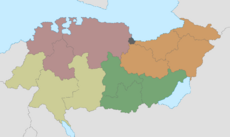Administrative divisions of Vierzland
This article is incomplete because it is pending further input from participants, or it is a work-in-progress by one author. Please comment on this article's talk page to share your input, comments and questions. Note: To contribute to this article, you may need to seek help from the author(s) of this page. |
The administrative divisions of Vierzland constitute the subnational levels of governance in Vierzland. Vierzland operates as a federal republic with a de facto system of cooperative federalism.
There are three primary administrative levels, in order from largest to smallest: Federal regions (Bundesregionen), Federal states (Bundesstaaten), and municipalities (Gemeinden). As of 2020, there are 4 Federal Regions, 14 Federal States, and 2,355 Municipalities.
History
Levels
Federal Regions
Every federal state with the exception of the Adtrus Capital Region belongs to a federal region (Bundesregion). Each of the four federal regions are constituted on a geographical basis and headed by a cabinet-level "Emissary" (Emissär) appointed by the Chancellor of Vierzland. The responsibility of the Emissary is to serve as a liaison between the state governments within the federal region and the federal government to ensure compliance with federal law.
| Federal Region | Vierz name | Constituent states | Emissary | Administrative centre | Largest city | Population | HDI (2019) |
|---|---|---|---|---|---|---|---|
| Northwest Federal Region | Nordwest-Bundesregion | Geismar Hauvel Steres |
Jürgen Braunbeck (NDP) | Nalbach | Bertenau | 23,268,425 | 0.928 |
| Northeast Federal Region | Nordost-Bundesregion | Jeien Jubenham Rastede Spinderau |
Egon Eichmann (NDP) | Gidenburg | Gidenburg | 19,864,288 | 0.901 |
| Southeast Federal Region | Südost-Bundesregion | Kastor Lonzig Promerow |
Moritz Riederer (NDP) | Nessa | Kasenberg | 26,996,941 | 0.903 |
| Southwest Federal Region | Südwest-Bundesregion | Annahof Graggenheim Vogach |
Holger Weis (VZP) | Wirscheid | Tillena | 16,194,362 | 0.894 |
Federal States
The federal states (Bundesstaaten, singular Bundesstaat), or simply "states", are the primary subnational polities according to the constitution. There are 14 federal states. While matters such as foreign policy, defense, and trade regulation fall under the sole jurisdiction of the national government, states maintain some sovereignty in areas such as healthcare, education, transport, urban development, and policing. States are subject to federal law, but are often responsible for determining the specific implementation and enforcement of federal statutes. Amendments to the constitution require the approval of ten state legislatures.
Each state government consists of a unicameral State Assembly (Staatsversammlung), which elects a Head of Government (Regierungschef). State-level elections are held concurrently with federal-level elections in 11 states.

